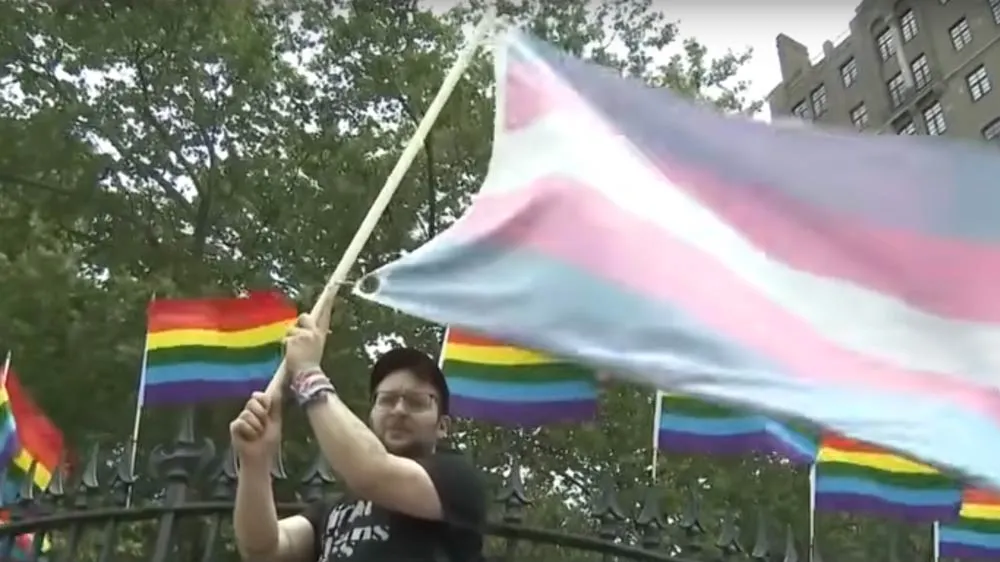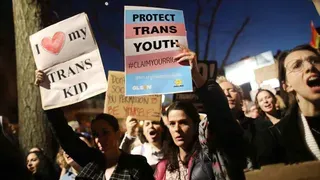June 14, 2007
Sending a Message :: Black and gay in Boston
David Foucher READ TIME: 4 MIN.
On June 8, the morning of the launch of JRI Health's new ad campaign drawing attention to the lives of gay men in Boston's black communities, JRI Health executive director Douglas Brooks got the chance to see the impact of the new campaign firsthand. Riding up Columbus Avenue on the 22 bus into Egleston Square, Brooks saw the billboard showing a young black man surrounded by his family. Above the photo, in bold letters, was the message, "I am gay - and this is where I stay." Underneath the photo was another message, "We have always been a part of this community. We are your sons, fathers, brothers, uncles, nephews and friends. It's time to treat us with the love we deserve."
Brooks said he was curious to see how his fellow passengers would respond to the billboard.
"[I was] on a bus full of black people, and wondering what the reactions would be.... I saw people looking at it. I saw people reading it. You can't help it, it draws your attention because it's so bold, and just the way the corner is, and the bus is going down Columbus, so it's there. You can't help but see it," Brooks told Bay Windows. "And I think more than anything the fact that there were no comments made me feel good. I thought, 'Okay, maybe people are just sort of taking it in,' or at least they're not making loud homophobic remarks on the bus. But I was very proud of it, too. I hope it makes a difference."
The Egleston Square billboard is part of a campaign launched June 8 called "We Are a Part of You." Originally developed and used in black neighborhoods in New York City, it consists of a series of three related ads. In addition to the ad with the photo of a young man and his family, there are two other ads in the series. One features three men on a basketball court and reads, "I am gay - and this is where I play." The other shows a young man in church with his pastor and reads, "I am gay - and this is where I pray." Brooks said the goal of the campaign, which will run on billboards and in MBTA stations in Roxbury, Dorchester and Mattapan, is to drive home the point in Boston's black communities that gay men have always been and will always be a part of those communities. JRI placed the ads in locations where they would be likely to catch people's eye. Brooks said he placed the ad with the pastor on a billboard in Dorchester at the intersection of Blue Hill Avenue and Talbot Avenue because of the high number of churches in the area.
"I placed that one there in particular because it's an area where there are several large black churches, and I thought the power of having that image of a gay black man and his minister standing there, reminding people that they're part of their congregations as well, was an important [message]," said Brooks.
State Sen. Dianne Wilkerson (D-Boston), who spoke at a June 8 press conference to launch the campaign, agreed that the placement of the religious ad in Dorchester, as well as the campaign as a whole, would send an important message to the community. "I actually do my worship on Blue Hill Avenue on Sunday, so I actually will see it coming and going. I could not think of a more perfect place to make a statement to remind people that it is our reality and we have to deal with it. I do think that we're having a different and much more advanced and progressive conversation in 2007 than we were even having in '97," said Wilkerson.
While the ads themselves make no direct mention of HIV/AIDS, Brooks said one of the goals of the campaign is to raise awareness about the link between anti-gay stigma and HIV infection. The ads urge people to visit the campaign website, wearepartofyou.org, which contains information about both HIV prevention and the impact of anti-gay stigma on increasing people's risk of infection. Brooks said the messages in the ads and on the website tie into research JRI Health has been conducting on the impact on the HIV/AIDS epidemic of anti-gay stigma directed toward black gay and bi men in Boston.
"One of the questions we asked [during interviews with subjects] was, if it was discovered that you were HIV positive, how would people in your life respond? And it ranged from people feeling like folks would care to some really painful revelations," said Brooks. "People felt like they would be asked to leave their homes, they wouldn't be accepted in their family. There was one guy I'll never forget who said that it was according to how he had contracted HIV, that if he had gotten it through drug use his family would be less discriminatory or less unwelcoming than if it was through homosexual sex, he said, 'because the gay ain't never gonna fly with my family.'"
Brooks said while the campaign urges acceptance by the larger black community of the gay men in its midst, it also sends a message of support to those men themselves.
"One of the things that came out over and over again in individual interviews and in focus groups [in my research] was the level of isolation that a lot of black men feel, especially black men who are not as integrated into the mainstream gay community, the larger gay community... And I think the images both are helpful to the community at large, to heterosexual folks, but also, and maybe even more importantly, to other gay people, just to see something that looks like them, that represents them, their lives, their full lives," said Brooks.
David Foucher is the CEO of the EDGE Media Network and Pride Labs LLC, is a member of the National Lesbian & Gay Journalist Association, and is accredited with the Online Society of Film Critics. David lives with his daughter in Dedham MA.







